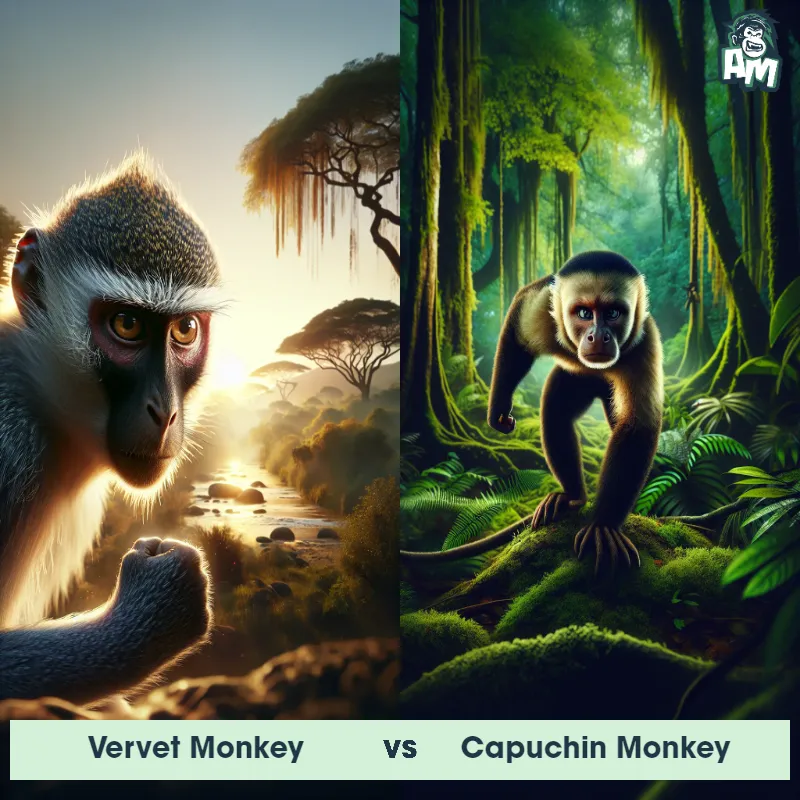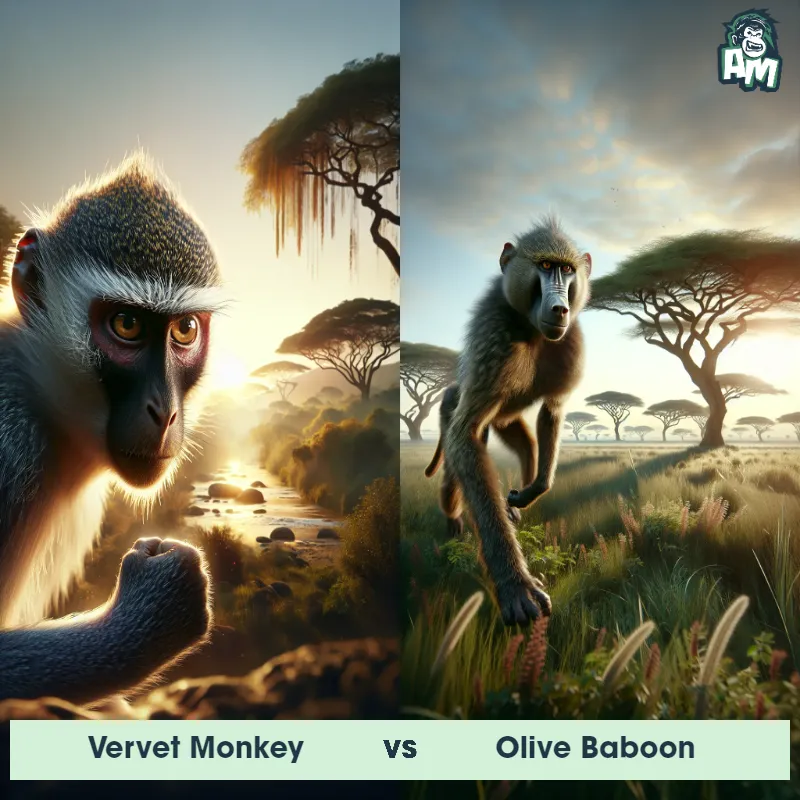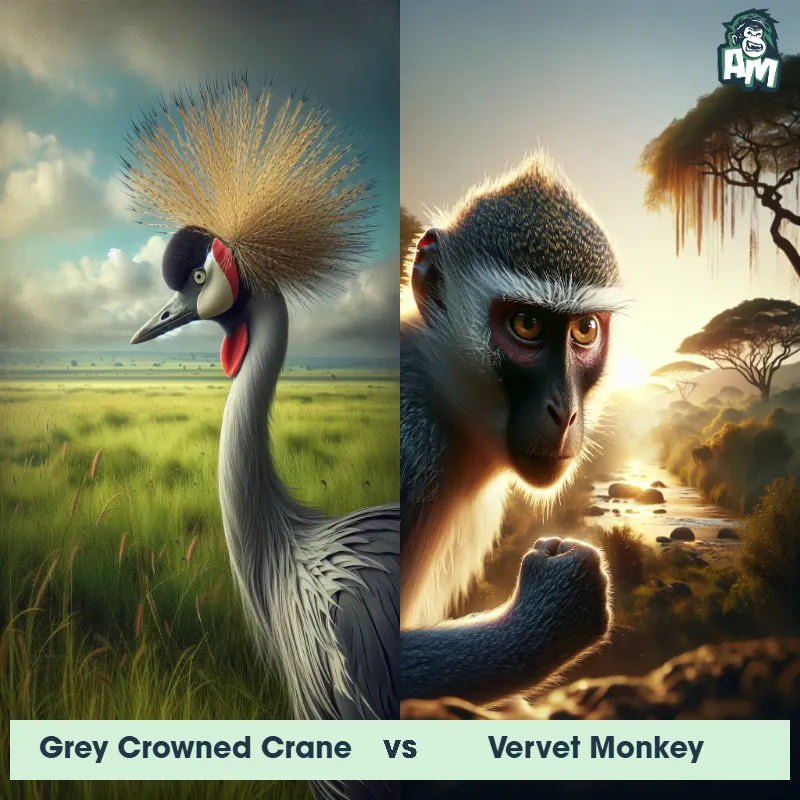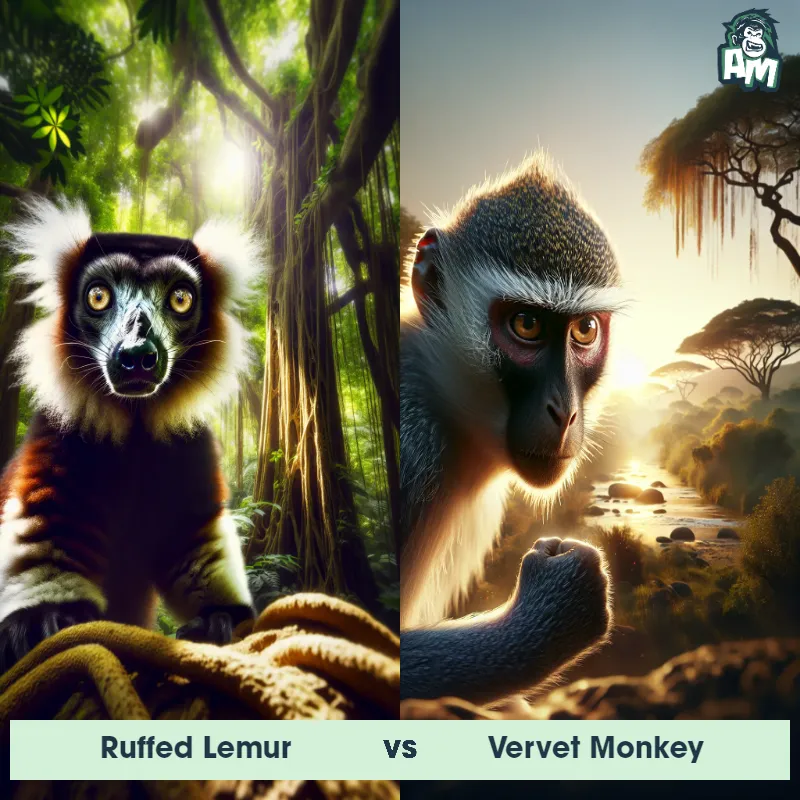The Vervet Monkey
The Vervet Monkey, also known as the Chlorocebus pygerythrus, is a medium-sized primate found in various habitats across sub-Saharan Africa. They are known for their slender and agile bodies, with males typically weighing around 7-8 kilograms and females around 5 kilograms. Their fur is predominantly grey with a lighter underbelly, and they have black faces with white fur around their eyes. Vervet Monkeys have a distinct social structure, living in troops of up to 50 individuals, and they are highly adaptable omnivores, feeding on fruits, leaves, insects, and small vertebrates.

| Vervet Monkey | |
|---|---|
| Size | 1.5-2.5 feet (0.45-0.76 meters) in height |
| Weight | 8-17 pounds (3.6-7.7 kilograms) |
| Speed | 33mph (53km/h) |
| Key Strength | Agility and speed |
| Biggest Weakness | Lack of physical strength |
| Scientific Name | Chlorocebus pygerythrus |
| Family | Cercopithecidae |
| Habitat | Forests, savannas, and urban areas |
| Geography | Native to the African continent |
| Diet | Omnivorous, primarily fruits, leaves, and insects |
| Lifespan | 8 years - 10 years |

The Vervet Monkey
The Vervet Monkey, also known as the Chlorocebus pygerythrus, is a medium-sized primate found in various habitats across sub-Saharan Africa. They are known for their slender and agile bodies, with males typically weighing around 7-8 kilograms and females around 5 kilograms. Their fur is predominantly grey with a lighter underbelly, and they have black faces with white fur around their eyes. Vervet Monkeys have a distinct social structure, living in troops of up to 50 individuals, and they are highly adaptable omnivores, feeding on fruits, leaves, insects, and small vertebrates.
Fun Fact: Vervet Monkeys have a complex alarm call system, with different vocalizations used to warn the troop about specific types of predators, such as snakes, eagles, or leopards.
| Vervet Monkey | |
|---|---|
| Size | 1.5-2.5 feet (0.45-0.76 meters) in height |
| Weight | 8-17 pounds (3.6-7.7 kilograms) |
| Speed | 33mph (53km/h) |
| Key Strength | Agility and speed |
| Biggest Weakness | Lack of physical strength |
| Scientific Name | Chlorocebus pygerythrus |
| Family | Cercopithecidae |
| Habitat | Forests, savannas, and urban areas |
| Geography | Native to the African continent |
| Diet | Omnivorous, primarily fruits, leaves, and insects |
| Lifespan | 8 years - 10 years |
Vervet Monkey Matchups
We use AI to simulate matchups between the Vervet Monkey and other animals. Our simulation considers size, strength, and natural predatory behaviors to determine the most likely outcome.
Vervet Monkey: Diet, Predators, Aggression, and Defensive Behaviors
What do Vervet Monkeys eat?
Vervet Monkeys are omnivorous creatures that primarily feed on fruits, leaves, seeds, insects, and small vertebrates. Their diet can vary depending on the availability of food in their natural habitat.
Do Vervet Monkeys have any predators?
Yes, Vervet Monkeys have several predators in the wild, including leopards, eagles, snakes, and large birds of prey. These predators pose a constant threat to the safety of Vervet Monkeys, especially when they are young or vulnerable.
Are Vervet Monkeys aggressive?
Vervet Monkeys are known to exhibit aggressive behaviors, especially within their social groups. They may engage in fights over food, territory, or mating partners. However, aggression levels can vary among individuals, and some may be more passive than others.
Do Vervet Monkeys fight?
Yes, Vervet Monkeys are known to engage in fights with each other, particularly during times of competition or conflict. These fights may involve displays of dominance, vocalizations, physical confrontations, and sometimes even injuries among group members.
How do Vervet Monkeys defend themselves?
Vervet Monkeys have several defense mechanisms to protect themselves from predators and threats in their environment. They may exhibit alarm calls to warn others of potential dangers, seek safety in trees or dense vegetation, or form alliances within their social groups to increase their chances of survival.
What is Vervet Monkeys' biggest weakness in a fight?
One of the biggest weaknesses of Vervet Monkeys in a fight is their smaller size compared to some of their predators or rivals. While they may exhibit aggression and defend themselves with strength and agility, their relatively smaller physical stature can put them at a disadvantage in confrontations with larger animals.
Fun Fact: Vervet Monkeys are known for their acrobatic skills, using their long tails to balance as they leap from tree to tree, sometimes covering distances of up to 8 meters in a single jump.
Fun Fact: Unlike many other primates, Vervet Monkeys have a unique blue scrotum, which is thought to serve as a visual signal of their social status and reproductive fitness within the troop.















